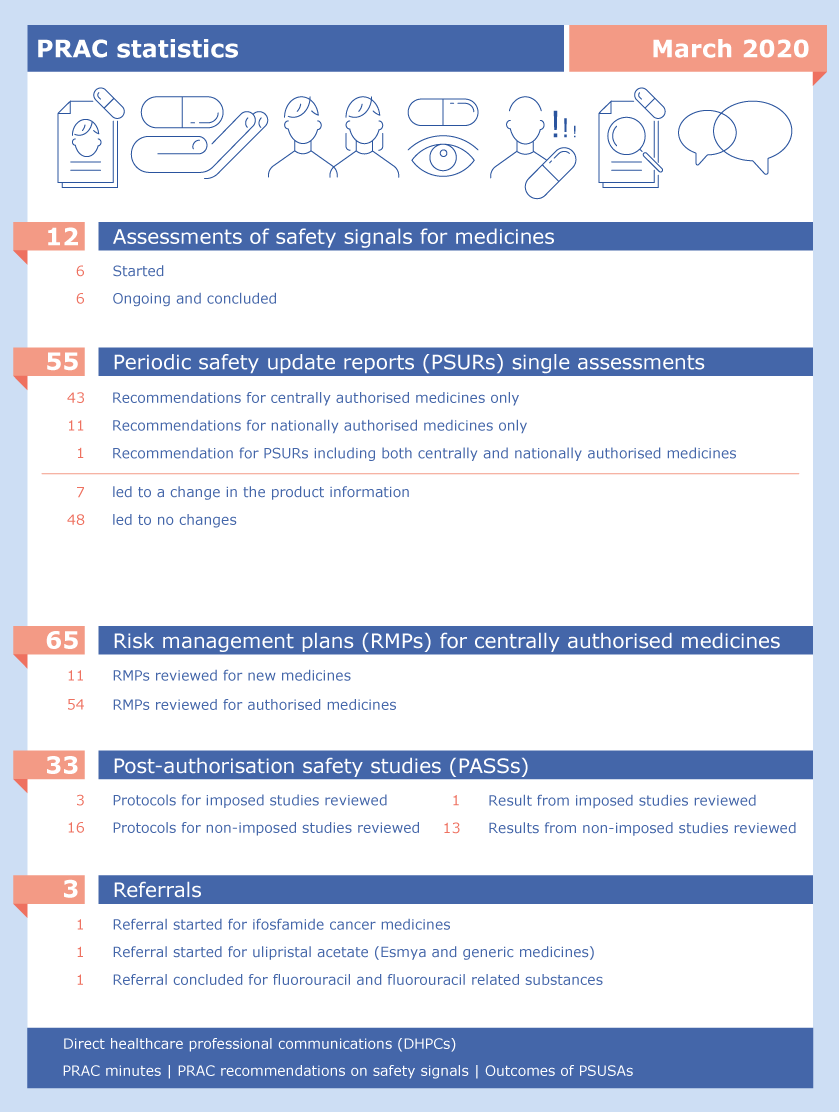Meeting highlights from the Pharmacovigilance Risk Assessment Committee (PRAC) 9-12 March 2020
NewsHumanPharmacovigilanceReferrals
At its monthly meeting, EMA’s safety committee (PRAC) has started a review of medicines containing ifosfamide to examine whether there is a higher risk of encephalopathy (brain disorder) with ifosfamide available as a ready-made solution or concentrate for solution than with the powder form.
Ifosfamide is used to treat different types of cancers, including various solid tumours and blood cancers such as lymphomas (cancer of white blood cells). The medicine is given into a vein and is available as a ready-made solution and a concentrate for solution in France and Germany, as well as a powder for solution for infusion. In most other EU Member States, it is only available as powder.
Following studies suggesting that the risk of encephalopathy with the solution is higher than the risk with the powder, the PRAC will assess the available data on this risk and recommend whether the marketing authorisations for these products should be maintained, varied, suspended or revoked.
More information is available below.
The PRAC has recommended that patients receiving fluorouracil given by injection or infusion (drip) and the related medicines capecitabine and tegafur, which are converted to fluorouracil in the body, should be tested for the lack of an enzyme called dihydropyrimidine dehydrogenase (DPD) before starting treatment.
For flucytosine, another medicine that gets converted to fluorouracil in the body, pre-treatment testing is not required, in order not to delay start of treatment of patients with severe yeast and fungal infections, including some forms of meningitis.
No pre-treatment testing is needed for patients treated with topical fluorouracil (applied to the skin to treat various skin conditions).
Lack of a working DPD enzyme (DPD deficiency), which is needed to break down fluorouracil, causes fluorouracil to build up in the blood, which may lead to severe and life-threatening side effects such as neutropenia (low levels of neutrophils, a type of white blood cells needed to fight infection), neurotoxicity (damage to the body’s nervous system), severe diarrhoea and stomatitis (inflammation of the lining of the mouth).
More information is available below.
The PRAC has recommended, as a precautionary measure, that women should stop taking 5-mg ulipristal acetate (Esmya and generic medicines) for uterine fibroids while a safety review started this month is ongoing. No new patients should start treatment with these medicines.
The start of the review follows a recent case of liver injury, which led to liver transplantation in a patient taking the medicine.
A 2018 PRAC review concluded that there is a risk of rare but serious liver injury with ulipristal acetate medicines for uterine fibroids, and measures were implemented to minimise the risk. However, as the new case of serious liver injury occurred despite adherence to these measures, the Committee has started a new review.
Cases of serious liver injury have been reported, including five that led to transplantation, out of over 900,000 patients who have been treated with ulipristal acetate for fibroids since its authorisation in 2012.
Ulipristal acetate is also authorised as a single-dose medicine for emergency contraception. This review does not affect the single-dose ulipristal acetate emergency contraceptive (ellaOne and other trade names) and there is no concern out liver injury with these medicines.
More information is available below.
Article-31 referral: Ifosfamide solutions
Article-31 referral: Ulipristal acetate 5mg medicinal products

Glossary:
|
Procedure |
Status |
Update |
|---|---|---|
|
Article-31 referral: Leuprorelin-containing depot medicinal products |
Under evaluation |
PRAC adopted a list of outstanding issues (LoOI). |
| Article-20 procedure: Picato | Under evaluation | PRAC continued its assessment. |